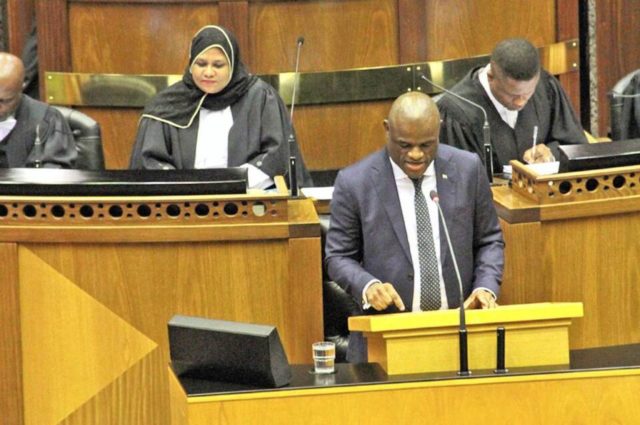“This will be supported by the remodelling of Public Works to strengthen the capacity of the provincial government to implement projects on time and on budget.”
A MASSIVE infrastructure roll-out programme, that will see an investment of R11.3 billion over the medium-term expenditure framework (MTEF), to stimulate growth in the Northern Cape economy has been announced by Premier Zamani Saul.
Saul made the announcement during his address at the debate on the State of the Nation address (Sona) on Tuesday.
According to Saul, the provincial and local government will collectively embark on the multibillion rand programme, which, he pointed out, will catalyse growth, create employment and enterprise development in the Province.
“This will be supported by the remodelling of Public Works to strengthen the capacity of the provincial government to implement projects on time and on budget.”
Saul pointed out in his address that there were huge untapped investment opportunities in the Northern Cape.
“We have identified a multi-nodal corridor in the Province, which stretches from the Gamagara mining corridor to the proposed Boegoebaai deep-water port. This corridor will provide substantial opportunities for towns such as Kimberley, Prieska, Kuruman, Kathu, Upington and Aggeneys. The key anchor projects along this line include the metal and protein cluster, Kathu Industrial Park and the Namakwa Special Economic Zone (SEZ). These opportunities provide potential for public-private partnerships and will yield the requisite investment and employment opportunities for the Province. “
Saul added that the Investment Council, convened by the president, had served as a platform to enable the Province to secure an anchor investor for the proposed Namakwa SEZ.
“This investment amounts to R26 billion translating to 6 000 temporary and 1 850 permanent jobs. The current zinc mining activities will trigger a new wave of industrial and economic development in the region. The envisaged number of direct and indirect jobs to be created across the multi-nodal corridor zone is 30 000.”
Saul stated that the Province was also well positioned to address the country’s energy crisis with the newly developed Independent Power Producers (IPP) capacity.
“The Province can produce more than 100% of its own electrical power needs from renewable energy sources, although in practice this energy is fed into the national grid. In line with what was pronounced in the Sona, the Northern Cape has 59 of the 64 operational renewable energy projects and 47 of the 90 active projects. The projects collectively have created 35 485 temporary jobs during the construction phase. In enhancing the value chain of these projects, the Province is looking into manufacturing of components required for the maintenance of the existing infrastructure.”
He continued that there were also major plans to industrialise the initiatives created by the Square Kilometre Array (SKA) and Southern Africa’s Large Telescope (SALT). “However, we need the national Department of Science and Technology to localise, commercialise and industrialise benefits to the Northern Cape. We are pushing for localisation of procurement, permanent research base support centres, assembling and supplying of construction and structural inputs to the projects.”
Announcing the provincial government’s plans for the next five years in terms of creating an inclusive information society where everyone has fast, reliable and affordable access to information and technology, Saul stated that internet connectivity and the establishment of wi-fi hot spots to all 223 provincial libraries and all Youth Service Centres had been fast-tracked.
“This will commence with the connectivity of 150 and increasing to 200 libraries by 2021.”
The provincial government in partnership with Afrovation and the Wireless Access Service Provider Association will also install 200 wi-fi hot spots in the Province. The first phase of installation includes 20 sites in the Sol Plaatje municipal area.
“Furthermore, in partnership with the Technology Innovation Agency, we are in the process of implementing community telecom co-operatives to support and sustain the wireless mesh project in the John Taolo Gaetsewe District, while a government portal would be created to connect citizens to government services and access to information.
“The Province is also implementing coding and robotics to enable pupils and teachers to derive benefits of digitisation towards 4IR (Fourth Industrial Revolution), focusing on science and innovation.
“Sol Plaatje University (SPU) is the only university in Africa to offer data science undergraduate and postgraduate degrees since 2014. Students enrolled in this course are equipped to compliment the SKA in terms of data science.
“The SPU continues to play an influential role in imparting digital skills to our various communities, by hosting hackathons, VacWork (vocational work) to various programmes and skills development initiatives.”
Saul also announced the implementation of the Computer Aided Ambulance Dispatch system in the EMS call centres. “This will ensure that we automate and modernise the communication systems to improve the response time of ambulances. Plans are at an advanced stage and implementation-ready.
“We are also working on the digitisation of patient files. West End hospital and seven feeder clinics have been identified as pilot sites and this programme will incrementally be rolled out throughout the Province. This will lead to improved efficiency and enhance the quality of health care services.”








